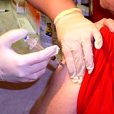
APIC Supports Required Annual Flu Immunization for Health Care Workers
In response to the low rates of influenza immunization among health care personnel, the Association for Professionals in Infection Control and Epidemiology (APIC) has announced its support for requiring flu immunization for health care workers who have direct patient contact as well as ancillary staff.
APIC further recommended that health care facilities obtain informed statements acknowledging the risk to patients from employees who decline the vaccine for reasons other than medical.
The recommendations, published in the APIC position paper "Influenza Immunization of Healthcare Personnel," states that health care facilities should implement a comprehensive strategy incorporating all of the guidelines for influenza vaccination of health care personnel from the Centers for Disease Control and Prevention's (CDC) Healthcare Infection Control Practices Advisory Committee (HICPAC) and the Advisory Committee on Immunization Practices (ACIP).
"We must do a better job of immunizing health care workers every year to ensure patient safety and protect those individuals at high risk of developing complications of influenza," said Linda R. Greene, RN, MPS, CIC, lead author of APIC's position paper and director of infection prevention and control at Rochester General Health System. "Despite longstanding recommendations by government agencies and national healthcare organizations, only 42 percent of healthcare workers receive yearly flu vaccines. Voluntary efforts are clearly not effective--it's time for hospitals and other healthcare facilities to require influenza immunization."
Influenza is a highly contagious disease that can be spread before symptoms appear. If a health care worker contracts the flu, they may spread influenza infection to patients and other workers before realizing they are sick. CDC estimates that influenza results in 226,000 hospitalizations and 36,000 deaths annually in the United States.
APIC recommendations for influenza immunization apply to health care personnel in acute care hospitals, nursing homes, skilled nursing facilities, physician's offices, urgent care centers, outpatient settings, and home health settings. All employees with direct patient contact should be immunized annually including physicians, nurses, therapists, dieticians, religious workers, housekeeping, and kitchen staff.
According to a recent poll of APIC members, the rate of flu immunization among infection preventionists--health care professionals who direct programs to reduce the risk of infection in their facilities--is 93 percent, well above the 42 percent rate for all health care workers.
"As infection preventionists we must lead efforts to implement proven strategies to ensure that all health care workers are immunized," Greene said. "By following a set of evidence-based measures, institutions can significantly raise yearly flu immunization rates and protect patients, employees, and their families from serious illness."
To access the APIC position paper, click here. For additional flu immunization information, click here.